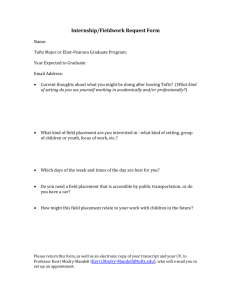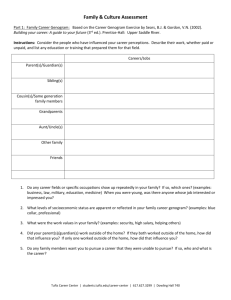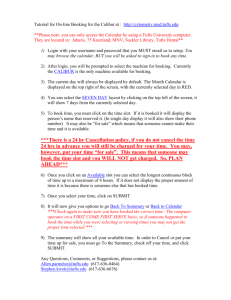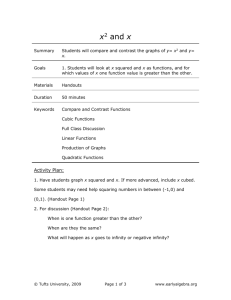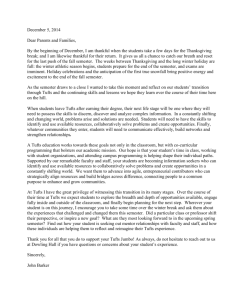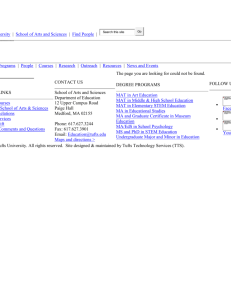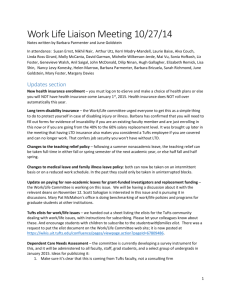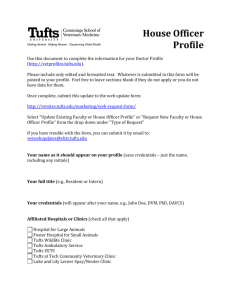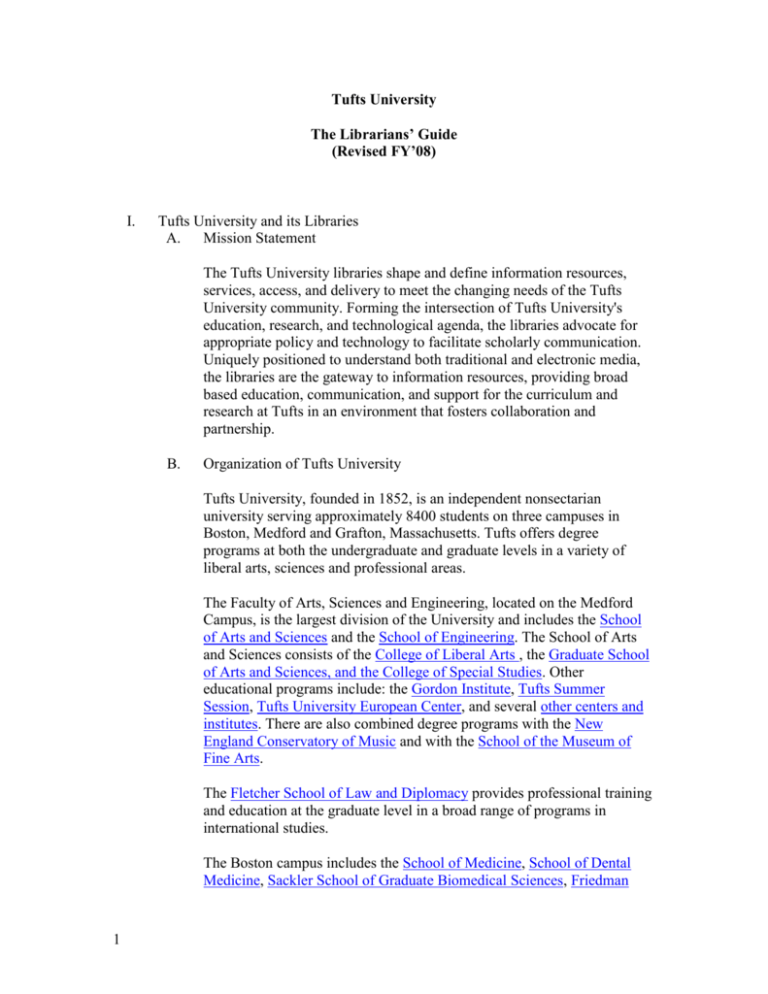
Tufts University
The Librarians’ Guide
(Revised FY’08)
I.
Tufts University and its Libraries
A. Mission Statement
The Tufts University libraries shape and define information resources,
services, access, and delivery to meet the changing needs of the Tufts
University community. Forming the intersection of Tufts University's
education, research, and technological agenda, the libraries advocate for
appropriate policy and technology to facilitate scholarly communication.
Uniquely positioned to understand both traditional and electronic media,
the libraries are the gateway to information resources, providing broad
based education, communication, and support for the curriculum and
research at Tufts in an environment that fosters collaboration and
partnership.
B.
Organization of Tufts University
Tufts University, founded in 1852, is an independent nonsectarian
university serving approximately 8400 students on three campuses in
Boston, Medford and Grafton, Massachusetts. Tufts offers degree
programs at both the undergraduate and graduate levels in a variety of
liberal arts, sciences and professional areas.
The Faculty of Arts, Sciences and Engineering, located on the Medford
Campus, is the largest division of the University and includes the School
of Arts and Sciences and the School of Engineering. The School of Arts
and Sciences consists of the College of Liberal Arts , the Graduate School
of Arts and Sciences, and the College of Special Studies. Other
educational programs include: the Gordon Institute, Tufts Summer
Session, Tufts University European Center, and several other centers and
institutes. There are also combined degree programs with the New
England Conservatory of Music and with the School of the Museum of
Fine Arts.
The Fletcher School of Law and Diplomacy provides professional training
and education at the graduate level in a broad range of programs in
international studies.
The Boston campus includes the School of Medicine, School of Dental
Medicine, Sackler School of Graduate Biomedical Sciences, Friedman
1
School of Nutrition Science and Policy, Jean Mayer USDA Human
Nutrition Research Center on Aging. The Tufts-New England Medical
Center, the principle teaching hospital for the School of Medicine, is also
located in the Boston Campus area.
As the only college of veterinary medicine in New England, the
Cummings School of Veterinary Medicine on the Grafton campus serves
as an important resource for educating future veterinarians, for providing
clinical veterinary services to animal owners throughout the region, for
serving as a resource to regional animal health specialists, and for
emphasizing new dimensions, such as ethics, wildlife, conservation, public
health, human-animal relationships, where contributions of veterinary
medical knowledge are of increasing value to all of society.
C.
Organization of the Tufts Libraries
All Tufts Libraries are open to, and serve, all members of the Tufts
community regardless of school affiliation.
Together the libraries subscribe to approximately 4,300 periodicals and
hold licenses to 15,000 electronic journals. The Tufts University 20062007 Fact Book listed the combined number of volumes in the Tufts
libraries as 1,177,130.
The total number of professional and support staff is approximately 130
persons and is supplemented by student assistants.
Tufts is a member of the Boston Library Consortium (BLC) and many
other cooperative library networks through which students, staff and
faculty members may gain access to the resources of other academic and
research libraries in New England.
Through interlibrary loan and electronic document delivery, the Tufts
community gains access to material held in collections throughout the
world. The Tufts Libraries provide access to their collections reciprocally.
Medford Campus
The Tisch Library and the Ruth Lilly Music Library provide resources and
services for Arts, Sciences and Engineering faculty, staff, and students.
The Edwin Ginn Library serves The Fletcher School of Law and
Diplomacy and contains collections in international studies, law and
diplomacy.
2
Digital Collections and Archives supports the Tufts Digital Library,
Records Management Program, and University Archives and Manuscript
collections.
University Library Technology Services (ULTS), housed at the Tisch
Library and reporting to the Provost's office, serves all the Tufts libraries
in support of overall library technology. The ULTS coordinates library
technology with university-wide technology initiatives and planning.
Boston Campus
The Hirsh Health Sciences Library provides resources and services for the
Friedman School of Nutrition Science and Policy, Sackler School, School
of Dental Medicine, School of Medicine, Tufts-New England Medical
Center, and the Jean Mayer USDA Human Nutrition Research Center on
Aging. The library collects in the fields of clinical medicine, dental
medicine, nutrition, and basic sciences, maintains several areas with
computers and computer labs, and participates in TUSK, Tufts University
Sciences Knowledgebase, the health sciences schools’ digital curriculum
project.
Grafton Campus
The Webster Veterinary Medical Library contains the largest animal
health collection in New England. In addition to clinical veterinary
medicine, other fields include wildlife and conservation medicine,
veterinary practice management, ethics and animal welfare. The library
manages the veterinary school’s participation in TUSK, the health science
schools’ digital curriculum project.
D.
Library Technology
1.
Integrated Library System
The Tufts libraries are linked by the Millennium integrated library
system from Innovative Interfaces, Inc. The system was
implemented in 2004 after a successful migration from our DRA
Classic system which was installed at Tufts in 1986. In addition to
the traditional features of an integrated system (acquisitions, serials
control, cataloging and the public catalog) Millennium also
includes modules for OpenURL resolution (WebBridge),
electronic resource management (ERM) and federated searching
(Metafind). WebBridge was implemented in 2005. ERM will
debut in 2007.
2.
3
Public Access Computing
The libraries on each campus include public access computers and
network jacks and wireless networks for laptop computing. The
libraries share licensed electronic resources through linked web
pages that are provided for Tufts patrons only through the libraries'
proxy server.
3. Library Webpages
All libraries have public webpages on a shared server, linked from
http://www.library.tufts.edu/.
In addition, ULC teams have a website at http://libstaff.
E.
Library Council
The University Library Council (ULC) is composed of the Directors of the
Tisch Library, the Ginn Library, the Health Sciences Library, the Webster
Family Veterinary Medical Library, the Digital Collections and Archives
(DCA), and the Director of ULTS. It is chaired by one of its members.
The Associate Provost serves as an ex officio member. (See ULC ByLaws) The ULC is the decision-making body for items that affect all Tufts
Libraries in the following areas: librarian promotions, creation of and
appointments to university-wide library committees, library automation
and technology, membership in the Boston Library Consortium, collection
management, and outside contracts. The Library Council drafts the
strategic plan for the libraries which is administered by library teams.
F.
Library Teams
The ULC convenes University-wide library teams, sending charges and
appointment letters in June. Teams select their team leaders. Library
directors review the team memberships annually to assure that their library
has adequate representation. The current teams and their membership and
charges are found at the Tufts Libraries Team Pages.
All teams are expected to post their minutes to the staff website as soon
after the meetings as possible.
G.
Boston Library Consortium Task Forces
Tufts is a member of the Boston Library Consortium, a co-operative
association of 19 academic and research libraries. Its goal is to strengthen
services to users of the member libraries.
The ULC appoints members to represent Tufts libraries on Boston Library
Consortium task forces. The Director of the Tisch Library shall be the
4
representative of the ULC to the BLC Board of Directors and shall
represent the ULC in all matters. Tufts' representation on other BLC
committees may rotate among the Tufts Libraries. The current BLC task
forces, their membership, charges, minutes and reports are available on the
BLC website. Each task force maintains a listserv to disseminate
information and solicit input.
The BLC also appoints and charges ad hoc committees as needed. In
addition to the standing task forces, the BLC assists in setting up BLC
Communities of Interest. The BLC Board of Directors is notified by
interested parties that they would like to start a Community of Interest,
then the group is free to meet. Involvement is voluntary and open to all
staff from BLC libraries.
II.
Professional Development
All librarians at Tufts are encouraged and expected to participate in professional
activities to continue their own development, to advance the profession, and to
enhance service to the library.
The Tufts libraries support their librarians in these activities in a number of ways.
Librarians may request support for their activities in the form of reasonable use of
copy machines, telephones, fax machines, computing resources, student assistance
(Tisch Library and DCA only), access to databases, and other library resources.
Professional leave for released time and library-supported travel may be
requested. The director of an individual's library will grant requests depending on
the budget and staff priorities.
Supervisors and colleagues are encouraged to mentor librarians in professional
development by sharing their knowledge of professional activities and other
development opportunities. Links to a wide variety of training opportunities
through associations, societies, and training organizations can be found on the
ULC Staff Development & Training Wiki.
A.
Association Activities
Each individual library will establish a process to approve, prior to
registration, all arrangements for released time and financial support for
librarians attending regional and national conferences. Supervisory
approval is the only requirement for attendance at local and nearby
regional meetings for which reimbursement is not being requested.
Each year all librarians are asked to indicate to their library directors,
through their supervisors, which professional meetings and conferences
5
they wish to attend. Permission to attend and financial support for
registration and travel expenses are provided according to the needs and
budgets of the individual libraries. If conflict arises, priority for support is
given according to the following guidelines:
Among librarians, first priority is given to: those presenting papers,
serving on committees or panels or participating in programs; candidates
for office or officers of professional organizations; designated
representatives of their library or professional association; those requested
to attend by their directors in order to gain specific knowledge or
expertise.
Second priority is given to those who are continuing their activity or
seeking to become active in a professional association.
B.
Research
The libraries recognize the importance of individual research contributions
to the profession as a means of advancement and a condition of
advancement to the highest rank. In general, as with other professional
activities, librarians will do this work as an adjunct to, and as part of, their
regular professional tasks. Such activities are described later in Review of
Documentation and the Decision Process.
In all cases, librarians contemplating a research project for which some
form of institutional support of either time or money may be needed
should discuss the project in advance with their supervisor and their
director.
C.
Continuing Education
Participation in continuing education, both formal and informal, is
expected of all Tufts librarians.
Tufts University offers tuition remission or reimbursement under certain
circumstances. Refer to the Tufts University Employee Handbook for
details.
Staff development programs may be conducted throughout the year within
the university library system and the BLC. The Human Resources
Organizational Development & Training team and University Information
Technology Training & Documentation Department offer programs
designed to enhance work-related skills. Courses are announced regularly
and all staff members are encouraged to participate, with the supervisor's
approval.
6
Librarians may attend specific workshops, seminars or institutes offered
elsewhere with the permission of their supervisor and/or their director.
These activities will give librarians the chance to improve their workrelated skills and/or to view their work in a larger context of serving the
library and university community and beyond.
Involvement in university life also offers opportunities for librarians to
grow and contribute as academic professionals. Academically sponsored
educational and cultural events on campus and the work of committees,
organizations and other university groups can open avenues leading to
university service.
III.
Appointments and Promotions
Concurrent with the University grades and bands the libraries institute a ranking
scheme based on years of professional librarianship. These ranks, although
similar to other academic institutions, are specific to Tufts University. The
following details delineate these ranks and the criteria for attaining each level.
A.
Status
Librarians are considered administrative staff insofar as grade, pay and
grievance matters are concerned, with librarian rank levels corresponding
to Tufts University broad-banding levels. (See Tufts University Employee
Handbook.) It is University policy that librarians undergo formal review
for purposes of promotion.
Library directors are outside the promotion and review process as
described in this document.
B.
Appointments
Standard University practices for professional personnel appointments
shall be followed.
Newly hired librarians with previous experience and advanced training
may be appointed to any rank consistent with their qualifications. The
director of the hiring library shall determine the rank of the individual
being hired
It is recommended that an appointment letter from the director state the
rank to which the librarian is being appointed the earliest date the librarian
is eligible for promotion, and the following sentence: "Please refer to the
Librarians' Guide for full information on the policies regarding
professional development, appointments, and promotions of librarians."
7
C.
Ranks
1.
Rationale for Ranking
In an academic institution, librarians contribute to the academic
and scholarly needs and requirements of the internal and external
community. Ranking rewards of these contributions by providing
official recognition of the knowledge and experience brought to
the position by an individual, and acknowledges on-the-job
progress and excellence in performance. It serves as an internal
mechanism, defined by Tufts University Libraries, for recognizing
professional development in terms of service to the University and
to the profession.
2.
Definition of Ranks
All librarians shall be appointed to one of the ranks described
below. Job titles, as determined by the home library and Human
Resources, are independent of rank.
AFFILIATE: This entry level rank is assigned to an individual
with a master's degree in library science or its equivalent and with
less than 2 years professional experience.
ASSISTANT: An individual qualifies for this rank after a
minimum of 2 years as an affiliate at Tufts OR 2 years
professional experience, and demonstration of effective job
performance and participation in professional activities.
ASSOCIATE: This third level is a senior rank. An individual
qualifies for this rank after a minimum of 3 years as Assistant OR
at least 6 years of professional experience, and demonstration of
effective job performance, contributions to the profession and
service to the Library and University communities.
LIBRARIAN: This is the highest rank within the system. An
individual qualifies for this rank after at least 6 years as Associate
OR at least 12 years of professional experience, and must
demonstrate consistent achievements in job performance, in
contributions to the profession and in service to the Library and
University communities.
“Years” shall be defined as years working in a professional
capacity for 17.5 or more hours per week, or that equivalency, at
Tufts or elsewhere.
D.
8
Promotions
1.
The Promotions Team
The process of promoting librarians is the responsibility of the
Promotions Team. The team consists of three to five members
including an alternate, the alternate to serve in any case of conflict
of interest. There is at least one member each from the Tisch, the
Hirsh Health Sciences Library, and as available a member from the
Ginn Library, Webster Veterinary Library, and DCA Library.
Terms shall be for three years. At least two new members, or one
member and the alternate, shall be added each year. If there is an
appeal process, a representative of the Human Resources
Department serves as an ex officio member of the team. .
The ULC prepares letters of appointment and announces the
membership of the Promotions Team for the upcoming academic
year.
The primary responsibility of the Promotions Team is to assess
colleagues' contributions to the Library, the University, and the
profession of librarianship. The main criterion for promotion is
significant contributions to the profession.
2.
Eligibility and Criteria for Promotion
Librarians may apply for promotion upon reaching the minimum
years of service for the higher rank as specified in the Definition of
Ranks.
Librarians at Tufts University are evaluated in the areas of
librarianship, professional experience, and contributions to the
profession in terms of research and service. (See below and also
Appendix A.)
Service to the University and library-related service to the larger
community are also strongly considered.
The weighting of these areas is described in Appendix A. Quality
(excellence) and quantity (productivity) of contributions are
assessed in as balanced and fair a way as possible through the
evidence the candidate presents. Especially at the higher ranks and
especially in regard to professional association activity and
research, the Promotions Team looks for evidence of sustained
productivity and independent thought. Innovation and originality
of contribution are valued in all categories of assessment.
Criteria for the various categories follow below:
9
a.
Librarianship
Academic librarianship furthers University programs of
instruction, research and service through planning,
implementation and evaluation of programs for acquisition,
organization and retrieval of recorded information. To carry
out these responsibilities, librarians must have knowledge
of the structure and nature of scholarly communication, of
the ways in which people acquire and process information,
and of the means by which information is stored and
retrieved. Excellence in job performance, the primary
qualification for a merit increase, is only one aspect of
academic librarianship, and is considered during the
promotion process in conjunction with other achievements.
The Promotions Team assesses the documentation provided
for evidence of quality performance and recognition in this
area. Examples of the types of evidence to be considered
are:
10
Ability to translate job functions into the more
general goals of the library system and the
University
Ability to work effectively with others, as
demonstrated by team and committee participation
Ability to promote library resources and services to
users
Ability to effectively manage and/or devise
innovative methods for information, materials,
serials, acquisitions, or cataloging activities
Ability to design, implement, or refine mechanisms
for organization and retrieval of information
Organizational, supervisory, and/or administrative
ability
Teaching ability, as demonstrated by database
searching, course-related instruction and library
instruction, curricula support and instruction of
colleagues
Creativity, originality and innovation, especially as
demonstrated by implementation, administration
and evaluation of staff and program development
Publication of articles in internal publications,
bibliographies, by-laws, internal reports, news
releases, procedural manuals, etc.
Continuing education, e.g., either further formal
study or self education in librarianship and
b.
information science, in new developments in the
field, in languages, or in other areas of subject
specialization
Involvement in the work of consortia and other
cooperative library endeavors
Library outreach programs
Awards, fellowships and honors
Contributions to the Profession
Contributions to the profession include research and
service. The Promotions Team assesses the documentation
provided for evidence of quality performance and
recognition in these areas.
i
At the Assistant level, membership and
participation in professional associations are
sufficient to satisfy the service requirement.
Participation in research activities is not required.
At the Associate level, proficiency in research and
service are encouraged but not required.
At the Librarian level, proficiency must be
demonstrated in both research and service.
Research
Research in librarianship expands the knowledge
bases of library and information science. Relevant
subject area research contributes to the knowledge
base of University programs.
Research and scholarly activities may include:
Publication, or confirmation of pending
publication, of the following in print or
electronic format:
o
o
o
o
o
11
Articles, preferably in refereed
journals
Bibliographies
Books, monographs, technical
reports, chapters of books
Book reviews
Thesauri
o
o
o
o
ii.
Statistical compilations
Exhibition catalogs
Information technology applications
Other research publications (e.g.,
abstracts, collection catalogs, etc.)
Papers presented at professional meetings
and conferences
Reports, proposals, grants and contracts to
support research, preferably as consultant,
project manager, or principal investigator
Creative works of substance and critical
recognition, in an area of relevant subject
expertise including published poetry and
photographs, exhibited paintings, etc.
Service
Service is involvement in professional, university,
and community activities related to the mission and
goals of Tufts University, its libraries and the
library profession. Only library-related community
activities are considered for promotion.
Service activities may include:
12
Professional and scholarly service
o Membership, participation, offices,
committees, task forces and
assignments in organizations
o Presentations at professional
meetings
o Workshops and conference
participation
o Editorship and editorial consultation
o Refereeing proposals and
publications
o Consulting for libraries and
organizations
o Teaching of library related
classes/courses/workshops outside of
Tufts University
o Awards, fellowships, and other
honors
o Involvement in consortia
University service
o
3.
Membership or participation on
committees, study teams, task forces
or other groups
o On-campus speaking engagements
o Formalized teaching and/or
preparation of teaching materials
beyond standard bibliographic
instruction
o Student advising
o Awards, fellowships, and other
honors
Library-related community service
o Community organizations: i.e.,
active participation, offices,
committees, or advisory groups
o Invited presentations
o Workshop and conference
participation
o Community and public activities as a
representative of Tufts University
o Awards, fellowships and other
honors
Procedures for Promotion
Participation in the promotion system is voluntary and the librarian
may decline or defer consideration for promotion. All aspects of
the promotion process are confidential.
a.
Candidacy
On July 1 the directors notify all librarians who by reason
of length of service or time in rank will be eligible for
promotion on October 1. Individuals must have the
required number of years for the respective promotion level
by October 1st of that year.
Librarians who wish to be considered for promotion must
submit an application (Exhibit A) to the Promotions Team
by October 1. Additional supporting information can be
submitted until October 15. The application packet must be
submitted electronically (or vial scanning) to
libpromo@elist.tufts.edu and must include:
13
Job description
Supporting letter from current supervisor
Application for Promotion (Exhibit A)
Documentation supporting promotion request,
organized and labeled in the categories of
librarianship, research, and/or service with list or
index identifying the documents as outlined in
Eligibility and Criteria for Promotion (p. 9). Note
that each document must be assigned to only a
single category: librarianship, service, or research.
Examples of documentation include, but are not
limited to:
Books, articles, chapters or other print
and/or Web publications
Copies of reports, policies or other
documents which the candidate contributed
to or was responsible for
Description of individual contributions to
committees or other groups
Description of educational achievements
Professional critiques of work, citations, etc.
Current resume
Cover letter summarizing the contents of the
promotion packet or document
The promotions packet should only consist of materials
completed since the date of the last application submitted
which resulted in a successful promotion. Previous
achievements may be described as a way of providing
context for an applicant's overall career, but the materials
for consideration should date from the last successful
application.
The packet may also include additional letters of
recommendation, professional critiques of work, and any
other relevant documentation.. URLs are sufficient for
websites.
Candidates should also refer and pay close attention to
Appendix A: Professional Experience and Weighting of
Criteria, Appendix B: Application Guidelines, and Exhibit
A: Application for Promotion Form.
b.
Review of Documentation and the Decision Process
The Promotions Team meets to review and evaluate the
documentation presented by the candidate and makes a
recommendation to the ULC in accordance with the
following guidelines:
14
If questions of accuracy of information arise concerning the
candidate's documentation, the Promotions Team makes
reasonable efforts to determine the correct information and
may ask for additional supporting documentation
The Promotions Team makes recommendations to the ULC
concerning the promotions, documenting its reasons by
November 15. The written report indicates the basis for
support or non-support, with reasonable specificity, to give
the ULC a basis for its decision. This report becomes the
basis for ULC’s recommendation letter to the Provost’s
Office.
The ULC reviews the recommendations. If it does not
agree, it remands the case(s) to the Promotions Team with
specific reasons by December 15.
The Promotions Team reconsiders the remanded case(s)
and resubmits its decisions to the ULC no later than
January 15. Favorable decisions are approved by the ULC.
The ULC may publicize the promotions to the University
community. By January 20 the chair of the Promotions
Team sends written notification to unsuccessful candidates
with an explanation of why the candidacy was denied, as
well as notification of tentative promotion to successful
candidates pending approval by the Provost
The ULC sends its recommendations for promotion to the
Provost for approval by February 1.
The Provost confirms the promotions by February 15, to
take effect on July 1.
.
c.
Appeal Process
Candidates who have not been promoted may file an appeal
with the Promotions Team. If the candidate believes that
there are grounds to appeal on the basis of discrimination,
the appeal should be directed to the Human Resources
Department with notification to the Promotions Team and
the ULC. All appeals must be filed by March 15.
15
The Promotions Team, including a non-voting
representative from Human Resources, considers written
evidence submitted by candidates in support of an appeal,
and meets with candidates who wish to present oral
evidence. The Promotions Team reports its decision on
appeals to the ULC no later than April 15.
If the decision is negative, the candidate may request a
hearing by a committee comprised of directors of the
libraries. This request must be made by May 1. The ULC
decides on the appeal no later than May 15th.
Reports of successful appeals are forwarded to the Provost
for approval no later than May 20. Actions on appeals are
reported to the candidates by the ULC no later than June 1.
4.
Promotion Timetable
16
Spring: ULC appoints Promotions Team for upcoming year
July 1: Candidates notified by directors of eligibility and invited to
submit application and documentation
Oct 1: Candidates must meet the required years of experience at
the time of application. Deadline for candidates to submit
application and documentation
Oct 15: Last date for submission of additional documentation by
candidate
Nov 15: Decision of Promotions Team forwarded to ULC
Dec 15: Completion of review by ULC; ULC may remand to
Promotions Team
Jan 15: Report by Promotions Team to ULC on review of
remanded candidacies
Jan 20: Notification to unsuccessful candidates by chair of
Promotions Team, and notice of tentative promotion pending final
approval to successful candidates
Feb 1: Report on promotions by ULC to Provost for confirmation
and announcement
Feb 15: Announcement of confirmation of promotions to
individuals
Mar 1: Announcement of promoted librarians by ULC to all Tufts
library staff
Mar 15: Deadline for appeal by unsuccessful candidates to
Promotions Team or Human Resources
Apr 15: Report by Promotions Team to ULC on decisions on
appeals
May 1: Appeal by unsuccessful candidates to a committee made up
of library directors
IV.
May 15: Report by Library Directors Committee to ULC of
decisions on appeals. ULC makes final decision.
May 20: Report by ULC to Provost for confirmation and
announcement of promotions after appeal
June 1: Report to candidates by ULC of decision on appeals
July 1: New ranks in effect
Procedure for Updating this Document
Every year in March (after the promotions cycle is complete), the Promotions
Team will review the Librarians’ Guide. The Team will submit edits to librarians
in April and will submit final edits to ULC in May. The Team will refine and
complete its revisions in early June and submit the Guide for approval to ULC so
that librarians who are considering promotion will have a current Guide by July 1.
17
Appendix A: Professional Experience and Weighting of Criteria
Rank
Professional
Experience
Required
Librarianship
Contributions to
the Profession
Affiliate None
18
2 years as an affiliate
at Tufts on or before
eligibility cutoff date
OR 2 years
Assistant
3/4
professional
experience prior to
applying for
promotion
1/4
3 years as an
assistant at Tufts on
or before eligibility
cutoff date OR 6
Associate
2/3
years professional
experience prior to
applying for
promotion
1/3
(Proficiency in
service and/or
research, with
both encouraged)
6 years as an
associate at Tufts on
or before eligibility
cutoff date OR 12
Librarian
1/2
years professional
experience prior to
applying for
promotion
1/2
(Proficiency in
service and
research)
Appendix B: Application Guidelines
The following partial list is designed to assist the candidate in organizing his/her promotion
packet. This is only a partial list and not intended to be definitive; candidates should use their
common sense and judgment in adding other activities to their packet. Note that while some
activities may qualify in more than one category (e.g., consulting may be listed under
research or service), the candidate may select only one category for each activity.
19
Activity
List Under
Awards, fellowships, honors
Committees, study groups, task forces, other groups
a. Within Tufts Library
b. Local library organizations
c. Within University
Conferences:
Contributed papers
Invited papers
Exhibition participation
Moderator
Other presentation (e.g., poster session)
Panelist
Consulting
Proposals, grants, contracts
Publications
Bibliographies, internal
Bibliographies, published
Book or chapters
Book reviews, brief
Book reviews, exhaustive/comparative
By-laws
Information Technology Applications
Journal articles
Newsletters, internal
Newsletters, external
Refereeing
Other (e.g., exhibition catalogs,
thesauri, statistical compilations, etc.)
Lib/ Svc
Lib/Svc
Lib
Lib/Svc
Svc
Res
Res/Svc
Svc
Res/Svc
Res/Svc
Res/Svc
Res/Svc
Res
Lib
Res
Res
Lib
Res
Lib
Res
Res
Lib
Svc
Svc
Res
20
Exhibit A *
APPLICATION FOR PROMOTION
TUFTS UNIVERSITY LIBRARIES
Name:
Library:
Department:
Position Title:
Supervisor:
Rank for Which Application is Made:
Date of Original Appointment:
Date of Last Appointment (if applicable):
In addition to this form, I am submitting the following material for review by the
Promotions Team:
a.
b.
c.
d.
Job description
Resume
Letter of support from current supervisor
Supporting Documentation. Please attach a list of all material being submitted as
supporting documentation, and note whether it is being presented as an example
of Librarianship, Research, or Service. Be sure to write a justification for any
activity for which there is no exhibit.
[Example:
1. Book Review "Legal Terminology"/Research.
2. Retrospective Conversion Project (project description)/Librarianship.
3. Serials Committee, BLC (committee work description)/Service.]
* Highlight this form, then copy and paste it into a word document to create an editable
file.
Copyright © 2007 Trustees of Tufts College. All rights reserved.
21

